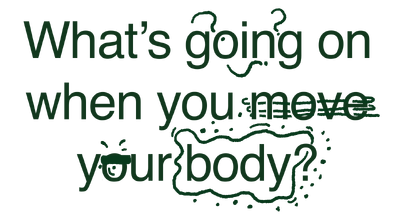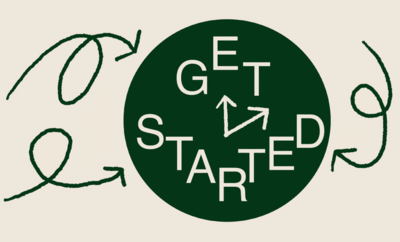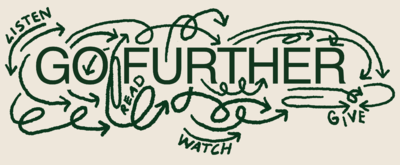Think back to a time you were in a mood. Did you stew in it or did you sweat it out? How about the last time you nearly drowned in boredom? Did you perchance shake it off with a walk? Whether you’re anxious, sleeping badly, or just agitated, the answer always seems to be exercise, and that’s with good reason. Our bodies were engineered to move—we once had to forage for food and escape from predators, after all—but for a growing number of us, our livelihoods depend on sitting sedentary, ready to respond to a ping at a moment’s notice. So for the many of us who work at a desk, movement has become either a luxury meant for our free time or an extra job to counter the effects of our real jobs. Here, we’ll review what exercise is actually doing for your body, and break the performance mindset to find joy in movement.

To be honest, a lot: Studies show exercise can strengthen your bones and muscles, help manage weight, improve sleep, and may stave off the common cold, flu, cardiovascular disease, diabetes, and many types of cancer. Combined, all these preventative benefits could lengthen your life significantly.
The mental benefits of working out are just as compelling. Since movement delivers oxygen and nutrients to the brain, it boosts energy, brainpower, and mood almost instantaneously. And there’s also this:
Working out helps us gain perspective: Exercise activates a region of the brain that helps you decide what to pay attention to, according to a 2021 study in Behavioural Brain Research. That means when you get moving, you gain better control over your ruminations and return more quickly to the feeling that things aren’t so bad.
It can cut your risk of anxiety and depression: A recent study found if people replaced sitting with running for 15 minutes or brisk walking for an hour, they could see a 26% decrease in odds of depression, says Karmel Choi, PhD, a clinical psychologist at Massachusetts General Hospital who led the study.

More and more workouts are geared toward physical and mental release. One cult workout simply named “The Class” bills catharsis as central to the experience. Moving to music, you repeat one action over and over until you’re doing it almost automatically, with the goal to restore balance between the body and mind.
Also geared toward expressing emotions through the body is an intuitive dance practice called 5Rhythms. “When you dance alone in your living room and rock out and feel total abandon and freedom... 5Rhythms is that in community,” says Hudson Valley 5Rhythms teacher Stephanie Diamond, who adds that moving freely helps you release pent-up feelings as you sweat.
An added benefit of these and all group workouts: A recent study found that when you try to move in synchrony with someone else, it also improves your self-esteem—even when you do it online.

Not as much as you think! For those who are able-bodied, the American Heart Association recommends 150 minutes per week of moderate activity (walking, biking, swimming) or 75 minutes of vigorous activity (HIIT, running), or a mix of both—plus twice-weekly strength work. The CDC advises people with physical disabilities to engage in regular physical activity according to their abilities, with guidance from their doctors.
“You don’t have to be a marathon runner or CrossFit guru to see benefits,” says Dr. Choi. “Even just moving throughout the day, whether it’s walking, stretching, or taking the stairs, all can add up in good ways for your mood”—and, studies show, for your body.
While fitness trackers recommend 10,000 steps a day (about 5 miles), that’s an arbitrary number set by a Japanese pedometer company in 1965, says Dr. I-Min Lee, an epidemiologist who studies the effects of exercise on longevity at Brigham and Women’s Hospital. Her research shows that far less activity can be beneficial. “If you’re inactive and your step count is 3-5,000, you might be daunted if I tell you to reach 10,000,” she says. “If you can just add a few more steps per day—2,000 more than you’re getting—you will improve your health.”
Even better news: Very short bursts of intense exercise help keep you in shape. According to a new study, just four seconds of intense intervals, repeated throughout the day, can counter some of the metabolic effects of sitting for prolonged periods.
Dr. Lee adds, “The onus shouldn’t only be on the individual to become more active. I believe systems need to change also—e.g., well-planned places to live, work, study, shop, etc., that encourage people to walk/cycle rather than drive.”
The best thing you can do no matter where you are is to move in a way that makes you happy. It’s not about performance, after all; it’s about reveling in your body and all the things it can do. Enjoy!

Make it a hunt!
Burned out on your usual walking loop? If a no-destination wander doesn’t cut it on the entertainment front, make it fun with a virtual treasure hunt like geocaching, which involves following clues on your phone to find treasures buried in public by other geocachers.
Give back
If helping others motivates you, try Charity Miles, an app that tracks how many miles you travel in whatever kind of exercise you choose. Each mile logged triggers a contribution from a corporate sponsor toward the philanthropic group of your choice. Bonus: You can do it alone or in a group!
Recruit a zombie
An app called Zombies Run gamifies running so you have a fun reason to charge around outside (you’re being chased by zombies!). After your first four “missions” collecting “supplies” and escaping the monsters, you get one free run a week, and you can upgrade to unlimited missions for $2.99 a month or $19.99 a year.

READ
In her hilarious new graphic novel “The Secret to Superhuman Strength, ” Alison Bechdel writes about her obsession with exercise.
LISTEN
Download Jon Mooallem’s Walking Podcast. It’s just audio from his nature walks, which can keep you company on solo walks wherever you are.
DO
Download Joyn, an encouraging, body-inclusive movement app that’s free to all. Also check out yoga instructor Arianna Elizabeth’sYouTube channel for scores of free, friendly classes.
GIVE
To help spread the benefits of exercise, donate to Black Girls Surf, a nonprofit surf performance training, coaching, and therapy program for girls of the African diaspora aged 7-17.

Prism Postcards takes the cringe out of wellness. It’s smart, inclusive, and funny. Sign up and get it delivered to your inbox every other week.

